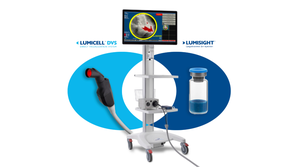The heart pump can help patients unable to get a transplant or are not eligible for one, along with those only taking medication or receiving palliative care.

Thousands of patients experiencing heart failure may have increased life expectancy when using Abbott Medical Devices HeartMate 3 heart pump, according to recently released data from the company’s MOMENTUM 3 five-year clinical trial. In the past, many heart failure patients who don’t qualify for a heart transplant rely heavily on medication or given palliative care to manage systems. However, newer technology advancements like the HeartMate 3 can offer a life-prolonging option. Now, MOMENTUM 3 -- the world’s largest randomized clinical trial to assess long-term outcomes in people receiving a left ventricular assist device (LVAD) to treat advanced heart failure -- showed that patients using the HeartMate 3 heart pump had extended survival of disease by at least 5 years.
"Thousands of people with advanced heart failure die every year because they do not receive a heart pump, largely because their physicians are not aware of the option or its full benefits," said Keith Boettiger, vice president of Abbott's heart failure business. "There are too many patients who aren't provided the opportunity to be evaluated for a heart pump, such as patients with obesity, diabetes, certain cancers, and blood types or those from underserved communities across the United States. With broader awareness and improved access to a heart pump, we can give these patients a chance at a longer, fuller life."
The HeartMate 3 pump is characterized as an implantable device that pumps blood throughout the body in people with weak hearts unable to do so alone. Using the company’s Full MagLev technology, the devices rotor is suspended by magnetic forces, reducing trauma to blood passing through the pump. This improves quality of life and patient survival, said a press release announcing the data. Pump related complications are lowered by these factors, along with its ability to produce an artificial pulse.
"The finding that the HeartMate 3 device can reliably add years to one's life is compelling evidence for all cardiologists to evaluate their patients with progressive heart failure for this therapy," said Daniel J. Goldstein, MD, surgical director, Department of Cardiothoracic and Vascular Surgery Cardiac Transplantation at Montefiore Medical Center. "Earlier referral and intervention are critical for this population where it can be challenging to make an accurate diagnosis from physical symptoms alone. The latest MOMENTUM trial data help contextualize the benefits of heart pumps and will help more physicians work with their patients to explore this life-enhancing and life-prolonging alternative as their disease moves into the territory of advanced heart failure."
The trial studied more than 1,000 patients and compared the company’s HeartMate 3 pump to its HeartMate II pump in ability to help people with New York Heart Association Class IIIB or IV heart failure. Going further than in previous MOMENTUM 3 studies, the new data goes beyond its two-year outcomes to show an 58% improved survival rate with the HeartMate 3 and 44% with the HeartMate II, after five years. The study detailed that the greater survival rate was largely associated with a reduction in deaths due to stroke, clotting, and bleeding compared to the HeartMate II.
"The MOMENTUM 3 study proves that the HeartMate 3 heart pump has significantly moved the needle in terms of options for increasing life expectancy for our most advanced heart failure patients," said Divya Gupta, MD, medical director of advanced heart failure and heart transplantation at Emory Healthcare. "This research shows strong consideration should be given for this life-extending therapy for the thousands of people who are in advanced heart failure and meet the indications for the HeartMate 3."
The data was recently presented in a late breaking session at the 2022 European Society of Cardiology Congress in Barcelona, Spain.
About the Author(s)
You May Also Like




